BIG READ: THE judge who presided over the shocking Sydney gang rape trials reveals why he first considered a 77-year sentence for ringleader Bilal Skaf. Plus podcast.
Just last week a man wanted to congratulate him for something he did 13 years ago when he made national headlines as the Judge who sentenced Bilal Skaf to a record 55 years behind bars for a series of gang rapes in Sydney.
Now retired from his role as a Judge, Mr Finanne QC is back at the private bar working as a barrister, and says he does not want to be defined forever for one case.
Nor is he a hero and he wants it made clear that he is opposed to racism of any kind and that his judgments were in no way anything to do with religion or race.
Mr Finnane has spoken publicly for the first time since he presided over the Sydney gang rape trials. In a candid exclusive interview with News Corporation, Mr Finnane revealed how he had initially come up with a 77-year sentence for the ringleader Bilal Skaf but then revised it down to 55 years. He describes a personal encounter several years ago in Goulburn Jail with several of the gang rapists, says the victims were courageous young women and that Bilal Skaf, a menace then, remains a menace.
“The Skaf trials were extraordinary, there is no doubt about it. Today is the 27th of August 2015. I think those trials started in 2002 or thereabouts.
”Even today I met a man who wanted to shake my hands because of the Skaf sentence and I have found that, throughout the years, wherever I go, all over the place, someone wants to shake my hand and talk about Bilal Skaf. So that in itself is extraordinary because very few cases create that degree of longevity … No-one seems to have forgotten the Skaf trials. It is really quite extraordinary.”
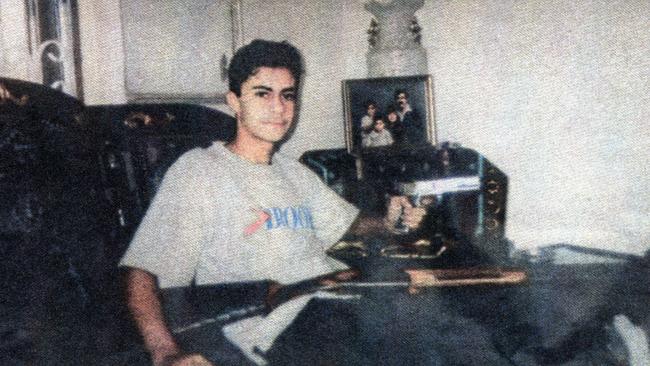
People related to it. Mothers, fathers, aunts and uncles all felt a connection because it could have been anyone’s daughter who ended up a victim of the gang. And he says these gang rapes were different to others.
“The other part of it was a very unusual feature of it, it was the first time there had been organised gang rape. There had been gang rapes before but this was organised with almost military precision and the rapists were not under the influence of drugs or alcohol.
“It was the first time there had been organised gang rape.”
“They were not picking up women in hotels who appeared to be intoxicated, they weren’t taking advantage of just some situation that presented itself. They were actually going out and seeking victims and there was a plan and the plan involved the victims being handed over to other people during the course of the event so to speak.
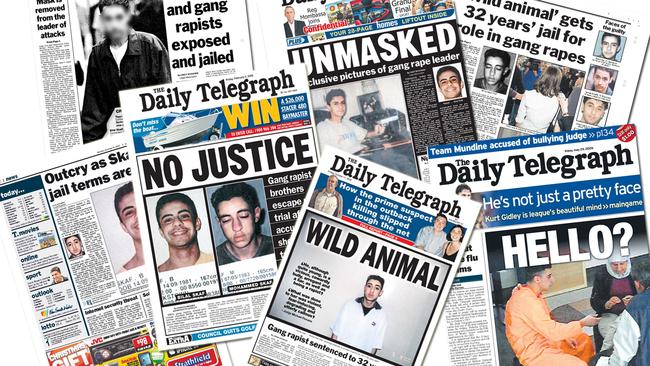
“Now that was extraordinarily unusual and it involved, for the first time to my knowledge, the use of mobile phones to do the organising. Now that proved to be a part of the undoing of those people was because what they didn’t know was that mobile phone usage can be tracked from tower to tower around Sydney, they can work out exactly what area a mobile phone is at a particular time …
“But I think for most people it was the fact that the girls were being kidnapped from streets and that they were then subjected to rape by groups of men in succession. One girl in particular got the worst of it, she got I think it was 14 men raped her 44 times in six or seven hours, something like that, most extraordinary.”
At the time, then Judge Finnane, described Bilal Skaf as “a menace to civilised society” and sentenced him to 55 years jail – the longest non-life sentence ever delivered (life was not an option).
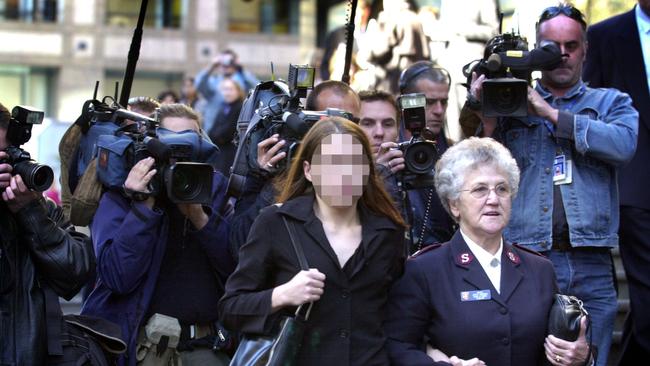
That has since been reduced to 31 years by the Court of Criminal Appeal.
Mr Finnane revealed that when he first sat down to work out Skaf’s sentence it came to a massive 77 years. It had been an extraordinarily complicated exercise – he was convicted of a large number of charges involving four victims and three separate gang rapes and he was the ringleader and instigator.
Mr Finnane wanted a sentence that reflected all of these things, in keeping with High Court wisdom that when sentencing for multiple offences, each separate offence should carry some punishment. At the time the maximum sentence for sexual intercourse without consent was 20 years.
“...You can give a sentence that is so extreme that it couldn’t be imagined”
“Initially I in fact had come up with a bigger sentence (than 55 years) and then I looked at it and said no that can’t be right, I had to go back and think again because you can give a sentence that is so extreme that it couldn’t be imagined,” Mr Finnane says.
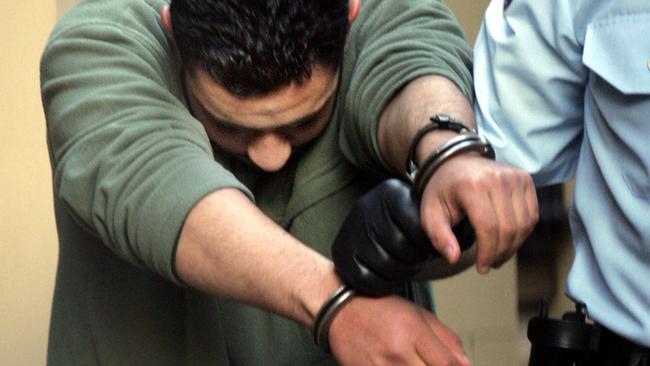
“The higher sentence was 77 years … I had added it all up, and I said that’s not right, I can’t do that, that’s too extreme. That’s too extreme, there’s something wrong with that. So what I had to then do was I had to go back and … a lot of the sentences had to be lessened. And then that got down to 55 years and I thought oh, that’s pretty big too but anyway, there we are.”
Calculating the right result
So he revised the sentence, paring back the years for the different offences, coming to the figure of 55 years. It was no easy task. “There were no previous cases that were anything like it. There was no inherited wisdom about this.”
Mr Finnane says he had no difficulty in describing Skaf as a menace.
“Such a person is a menace, that’s all you can say.”
Skaf refused to accept any responsibility for what he did, refused to acknowledge he was involved, despite his DNA at the scene and a myriad of other evidence against him and tried, unsuccessfully to turn the trials into a farce.
“In my view, if he were let out, well he will be let out at some point, but everyone would want to watch out when he is because he will be just as menacing then as he is now.”
“...Because he will be just as menacing then as he is now.”
“So no submissions, no contrition, no remorse, no nothing and the final word was Bilal Skaf, as he was being taken away after being given 55 years he said “and I am not guilty you c*nt”.
Mr Finnane remembers the words clearly and the way they were spat at him. He has not seen Skaf since that historic day.
But he has seen three of the other gang members. Judges have the right to visit jails and experience the conditions. On one such visit to Goulburn jail, about five years ago, the rapists approached him and one of them said to him : “You know we are innocent men and the sentence is so cruel it is going to ruin our young lives, make us feel embittered.”
They told the then Judge they wanted to write to him. He said sure, go ahead, but he never got a letter.
“It’s not me who has ruined their young lives, it’s not the jury who has ruined their young lives, it’s them and what about the victims.
“So I didn’t feel tears rolling down my face I’ve got to say. I was surprised that they wanted to talk to me,” Mr Finnane says of their approach.
He has never been threatened or felt unsafe as a result of the cases. The only letters he ever received were supportive. They came from all over Australia and even from New Zealand, from a group of construction workers, who had banded together to send him a note of support. Another was from a woman in Queensland who wrote that she had been raped 40 years earlier, had never told anyone, never married and lived a lonely life and that the Judge’s comments and sentence had given her a sense of relief.
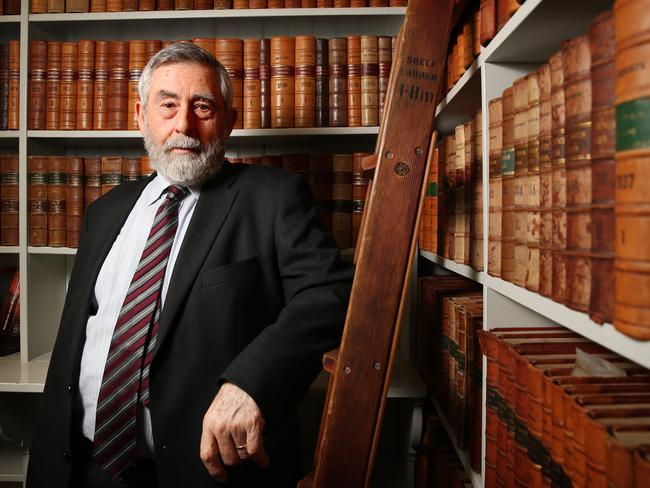
A fair sentence for the crime
But one thing which caused him consternation was an assumption that his judgments were punishing Muslims.
“One thing that I found really quite difficult to accept was the assumption of many people, including many commentators, that I was involved in some way in punishing Muslims. I was not. Indeed I went to some trouble in my various judgments to make it clear that religion played no part in any of the events of the gang rape trials that I dealt with, nor did the racial origins of the rapists. What the trials concerned were crimes,” Mr Finnane says.
At the time authorities wanted to take precautions. The then Sheriff of NSW insisted that the then Judge abandon his normal practice of riding his pushbike to work each day and, for his own safety, be picked up from home and driven to work and back each day in a car. That lasted a week before Mr Finnane returned to his bike. He found the formality of a special car made him feel conspicuous not less. And he didn’t feel under threat anyway.
Mr Finnane is full of praise for the victims who, by coming forward and enduring days of painful and gut-wrenching questions in the witness box, ensured that Skaf and his gang were locked away.
“They were very courageous young women, all of them, and they had to submit to a terrible ordeal.”
Mr Finnane believes it is “very likely” that other young women fell victim to the same gang but never came forward. This, he says, is just a personal view and not based on anything more.
“No-one to this day has ever found out why he (Skaf) did this. What was it? … I don’t know why they did it because they won’t say … They were out to debase these girls for some reason but what the reason was no-one knows,” Mr Finnane says now.







How tragic end of two young lives ripped Echuca families apart
Two well-known drag racing families were torn apart by “a few seconds of thrill” that has left them with a “lifetime of pain”. Read their harrowing words about the impact of the deadly crash.
Long way to the top: The journey of the world’s greatest rock band
The world’s biggest rock band AC/DC packed out regional halls and suburban pubs across Victoria for $3 per ticket before they ever dreamt of selling out stadiums. These lucky fans were front and centre.